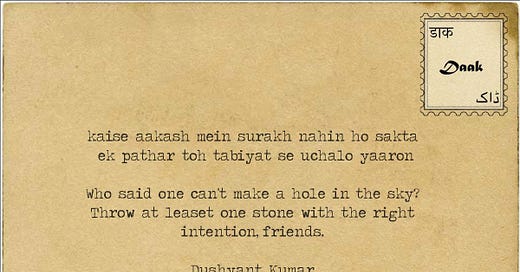Dushyant Kumar (1933 - 1975) was a prominent Hindi language poet and a pioneer of the Hindi ghazal. He worked as a scriptwriter for All India Radio and wrote at a politically sensitive time, the Indian Emergency of the 1970s. He is often hailed as the voice of the Indian youth during those turbulent times. His provocative poetry, which transverses themes of love and rebellion, is more relevant than ever before.
Kumar wrote stinging critiques of establishments in lyrical verse – the spirit of dissent alive in each expression.
kahan toh tai tha charaghan har ek ghar ke liye
kahan charagh mayassar nahin shahar ke liye
//
Oh how it was promised, a lamp for every home
Oh what we have come to, no lamp for the entire city
His verses urge the oppressed to mobilise and fight for their rights, a necessary impetus in times when the oppressor seems undefeatable.
kaise aakash mein surakh nahin ho sakta
ek patthar toh tabiyat se uchhalo yaaron
//
Who said one can’t make a hole in the sky?
Throw at least one stone with the right intention, friends.
It would be timely, then, to read one of his most popular works that evokes the unbridled power of the masses uniting for a just cause.
ho gai hai peer parvat si pighalni chahiye
is himalay se koi ganga nikalni chahiye
aaj ye divar pardon ki tarah hilne lagi
shart lekin thi ki ye buniyad hilni chahiye
har sadak par har gali mein har nagar har gaanv mein
haath lahrate hue har laash chalni chahiye
sirf hangama khada karna mera maqsad nahin
meri koshish hai ki ye surat badalni chahiye
mere seenay men nahin toh tere seenay men sahi
ho kahin bhi aag lekin aag jalni chahiye
//
This pain that has frozen into a mountain must melt
A Ganga must erupt from this Himalayan belt
Like a thin fragile veil, this wall today shakes
But the wager was to make the foundation quake
In every village, every town, on every street, every alley
Hands waving in protest, every corpse must rally
Merely raising a hollow ruckus is not my intent
The situation must change; we must make a dent
If not in my bosom, then in your bosom’s urn
For it doesn’t matter where, but this fire must burn.
(Translation by Nikita Gupta)
In the end, Kumar reminds us, no matter how dire the circumstances, justice will prevail and until then, we must persist and resist the oppressors.
vo mutamin hain ki patthar pighal nahin sakta
main be-qarar hun avaz men asar ke liye
//
They believe that the stone cannot melt
I can’t wait for the power of the voice to take effect
jien toh apne bageeche mein gulmuhar ke tale
maren toh gair ki galiyon mein gulmuhar ke liye
//
One must live in a garden under the Gulmohars
One must die in an alien street, for the Gulmohars
(Translations by Mohini Gupta)




bohat hi khoobsoorat
bohat hi khoobsoorat